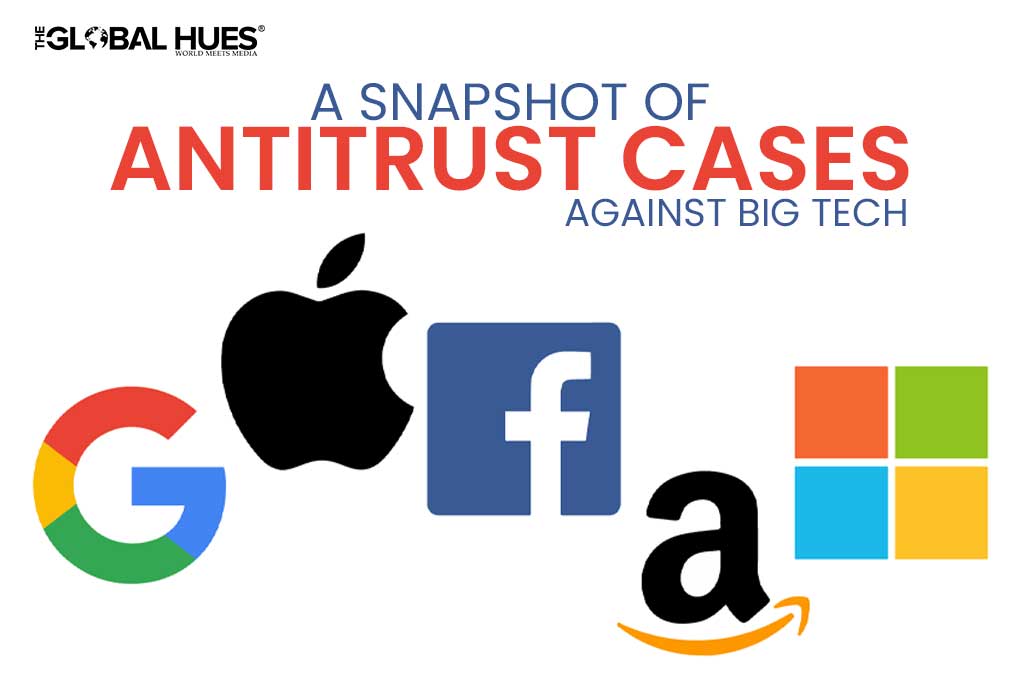If we say that big tech has become too big, the five names that would immediately come to your mind are Google, Facebook, Amazon, Microsoft, and Apple. We understand that this might feel like old news to you but have you ever thought about how these technology superstars have launched into a completely different stratosphere?
Before we get into understanding the antitrust cases against these tech giants, it’s really important to understand how big are they. These companies have become bigger and bigger and their business decisions have had a major impact on our daily lives and society.
In the last couple of years, the European Union has issued a series of multi-billion dollar rulings against big tech companies. Antitrust regulators in India, Australia, South Korea, and the post-Brexit UK have started to launch investigations and levy fines with an aim to shift tech giants’ business practices.
Let’s one by one talk about major antitrust cases against these tech giants:
-
GOOGLE
| Regulatory Body | Allegations | Date Opened | Status |
| European Commission | abusing search dominance to favour its own shopping product | November 30th, 2010 | The EU fined Google $2.7 billion in 2017. Google is appealing the fine. |
| European Commission | abusing its mobile operating system dominance to favour its own services | April 15th, 2015 | The EU fined Google $5 billion in July 2018. Google is appealing the fine. |
| European Commission | suppressing competition in digital advertising | July 14th, 2016 | The EU fined Google $1.7 billion in March 2019. Google is appealing the fine. |
| Competition Commission of India | monopolizing mobile payments | November 8th, 2020 | Investigation ongoing |
-
Violations over Shopping Searches
The European Commission fined Google $2.7 billion for violations over shopping searches. The finding stated that Google gave prominent placement to its own comparison shopping service. The platform also demoted rival comparison shopping services in its search results. The evidence in fact showed that even the most highly ranked rival service appeared on average page four of Google’s search results.
-
Android Antitrust Violations
Google was fined $five billion by EU regulators for abusing its Android market dominance in three areas. First, Google was bundling its search engine and Chrome applications into the operating system. Google also blocked phone makers from creating devices that run forked versions of Android. Last, it made payments to certain large manufacturers and mobile network operators to bundle the Google Search app on handsets.
-
Abusive Practices in Online Advertising
EU fined Google $1.7 billion in March 2019 for abusing its market dominance by imposing a number of restrictive clauses in contracts with third-party websites which prevented Google’s rivals from placing their search adverts on these websites. The giant first imposed an exclusive supply obligation (to prevent competitors from placing any search adverts on commercially significant websites) and then introduced ‘relaxed exclusivity’ to reserve for its own search adverts the most valuable positions and at controlling competing adverts’ performance.
-
Over Payments App
The investigation is still going on, of this case. The case was opened by India to Google for allegedly abusing the dominant position of its app store to promote its payments service in the world’s second-largest internet market.
-
AMAZON
| Regulatory Body | Allegations | Date Opened | Status |
| European Commission | using its e-commerce monopoly to unfairly compete against third-party sellers | July 17, 2019 | Investigation Ongoing |
| Federal Cartel Office | monopolizing e-commerce | May 18, 2021 | Investigation Ongoing |
| Washington, DC, attorney general | suppressing competition in e-commerce | May 25, 2021 | Lawsuit filed |
-
Unfair use of e-commerce monopoly
The European Commission charged Amazon for using data on third-party sellers that use its marketplace to boost sales of its own label goods. Margrethe Vestager, the EU’s Competition Commissioner said that data on the activity of third-party sellers should not be used to the benefit of Amazon when it acts as a competitor to these sellers.
-
Monopolising Ecommerce
Germany’s Federal Cartel Office launched a new investigation into whether the e-commerce giant is exploiting its market dominance. The watchdog has already initiated proceedings against the price control mechanisms of Amazon and its relationships with third-party sellers.
-
Suppressing Competition
DC Attorney General Karl Racine sued Amazon, accusing the giant of suppressing competition by placing strict conditions on what third-party sellers can do outside of the company’s platform. It has been alleged that Amazon is unlawfully maintaining its monopoly power by preventing independent sellers from offering products at lower prices on other similar platforms.
-
FACEBOOK
| Regulatory Body | Allegations | Date Opened | Status |
| European Commission | using its digital advertising market power to improperly compete against third-party advertisers on its platform | June 4, 2021 | Investigation ongoing |
| Competition and Markets Authority | monopolising the world’s supply of gifs | January 28, 2021 | The CMA ordered Facebook to sell off Giphy. Facebook is appealing the order. |
| 48 state attorneys general | suppressing competition from social media rivals | December 9, 2020 | States are appealing after a judge dismissed their lawsuit |
| Federal Cartel Office | abusing its monopoly on social media to improperly harvest user data | March 2, 2016 | The office ordered Facebook to stop combining user data from separate apps without consent. Facebook is appealing the order. |
-
Anticompetitive Conduct
The EU opened a formal antitrust investigation to find out whether Facebook violated EU competition rules by using advertising data gathered in particular from advertisers to compete with them in markets where the tech giant is active such as classified ads.
-
Monopolizing GIFs supply
UK regulators called out Facebook for monopolising the world supply of GIFs. As a consequence, it ordered Facebook to reverse its acquisition of the animated GIF platform Giphy.
-
Illegally Crushing Competition
The Federal Trade Commission and 40+ states accused Facebook of buying up rivals to illegally crush the competition. Facebook’s purchases, especially the purchase of Instagram for $1 billion and Whatsapp for $19 billion eliminated competition that could have one day challenged the dominance of Facebook.
-
Abusing Monopoly on Social Media
The Federal Cartel Office investigated Facebook for suspected abuse of market power over breaches of data protection laws in the first formal probe of the social network for violating competition rules.
-
APPLE
| Regulatory Body | Allegations | Date Opened | Status |
| European Commission | Keeping mobile payments system closed to competitors | May 2, 2022 | Investigation ongoing |
| European Commission | monopolizing mobile music streaming | Apri 30, 2021 | Investigation ongoing |
| sued by Epic in US district court | monopolizing in-app purchases | August 14, 2020 | A judge ordered Apple to change some of its App Store policies, but rejected antitrust allegations. Apple and Epic are appealing. |
-
Monopolising Mobile Payments
EU charged Apple for keeping its mobile payments system closed to competitors. Apple may be compelled to open up its mobile payment technology used for the maintenance of wallets to other players existing in the market. The company could face a fine of up to 10 per cent of its global turnover of $3.6 billion.
-
Monopolising mobile music streaming
Apple was accused of distorting competition in the music streaming market, siding with another popular music platform Spotify in a case that could lead to a hefty fine and changes in the iPhone maker’s lucrative business practices.
-
Monopolising in-app purchases
Epic Games (an American video game and software developer company) implemented its own in-app payment system in August 2020 on iPhones to avoid Apple’s fees, a violation of Apple’s App Store rules. Apple removed Epic’s apps, including the blockbuster ‘Fornite’ game, from its store. Epic later filed an antitrust lawsuit alleging that Apple abused its dominance in the market for mobile apps.
-
MICROSOFT
| Regulatory Body | Allegations | Date Opened | Status |
| U.S. Government | monopolising the personal computer market | 1990s | It was ruled that the company violated multiple sections of the Sherman Antitrust Act |
| US District Court | Violating consumers’ biometric privacy | June 30, 2022 | Investigation ongoing |
-
Monopolising The Personal Computer Market
In the 1990s, US federal regulators sued Microsoft for monopolising the personal computer market. The federal agency soon ended its investigation and the case was brought up again by the US Department of Justice in 1998. It was found out that for customers who wanted to access a particular Microsoft application, buying the Microsoft Windows operating system was a prerequisite.
-
Violating Consumers’ Biometric Privacy
Pasinee Bhavilai claimed that Microsoft violates the Illinois Biometric Information Privacy Act by improperly collecting facial biometric data of users of its Photos app on Windows 10 and Windows 11 operating systems. Bhivlai claims that Microsoft is failing to inform users why it collects biometric information.
Concluding Lines
Developed with an aim to protect consumers from predatory business practices, Antitrust laws ensure the existence of fair competition in the market. They have to do with regulating monopolies, or companies that grow too big to stifle competition and harm consumers.
Not so long ago, antitrust cases announced by the legislative body or government used to become major news. Nowadays, the scenarios have changed. Investigations are passed between different authorities and conclusions are usually thrown into doubt as the organisations affected by these decisions file appeals.
Source: The information in this article has been taken from Quartz, a digitally native news outlet.
Must Read:
- TOP 10 RICHEST BILLIONAIRES IN THE WORLD 2022
- Top 10 Indian Origin CEOs Leading International Companies
- TOP 10 IN-DEMAND SKILLS FOR 2022
- SUCCESS STORY OF TIM COOK: A MAN WITH A VISION
- HIGHEST-PAID CEOs IN THE WORLD
- Success Story Of Mukesh Ambani
- TOP 10 NEWSPAPERS IN THE WORLD 2022
- Elon Musk: Biography Of A Self-Made Entrepreneur And Billionaire
- 10 GADGETS TO KEEP YOU COOL THIS SUMMER
- 7 R’s Of Waste Management – Steps To Sustainability
- What Are The 5 Must Watch Netflix Thrillers




